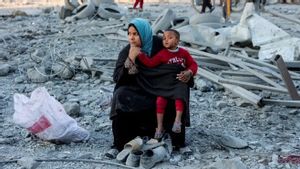JAKARTA - The World Health Organization (WHO) reveals that one in three women worldwide experiences physical and sexual violence during their lifetime. This violence, in a WHO study, is even predicted to increase as the spread of the COVID-19 pandemic has subsided.
"Violence against women is endemic in every country and culture, causing harm to millions of women and their families, and has been exacerbated by the COVID-19 pandemic," said WHO chief Tedros Adhanom Ghebreyesus, quoted by Reuters, Thursday, March 11.
WHO recorded 31 percent or 852 million women in the 15-49 age group or 852 million women as victims of physical and sexual violence. The data, said Tedros, was the result of the updating of the 2000-2018 national survey.
WHO encourages governments in every country to immediately take preventive measures. Regarding victims, WHO also calls on the governments of each country to improve services for victims of violence, especially educational institutions.
Every school is encouraged to educate male students to respect women. This effort was revealed by WHO based on the fact that the perpetrators of violence were those who in fact lived as husbands or partners of women.
More is not recordedWHO realizes that there may be more victims of violence who are not included in the data collection. This fact is none other than because in some of the poorest countries, data related to sexual victims is quite difficult to obtain.
"These numbers are staggering and really are a kind of call for the government to do more, to prevent this violence," said report author Claudia Garcia-Moreno.
In some areas, there is the fact that half of the female population experiences physical and sexual violence. The region includes Oceania, sub-Saharan Africa and South Asia.
Meanwhile, countries with the highest number of female violence are in Kiribati, Fiji, Papua New Guinea, Bangladesh, the Democratic Republic of the Congo, and Afghanistan.
“This is a very important time in life. And we know that the repercussions of this violence can be lasting and can affect physical and mental health and lead to unwanted pregnancies and other complications, ”Tedros.
BERNAS OthersThe English, Chinese, Japanese, Arabic, and French versions are automatically generated by the AI. So there may still be inaccuracies in translating, please always see Indonesian as our main language. (system supported by DigitalSiber.id)









